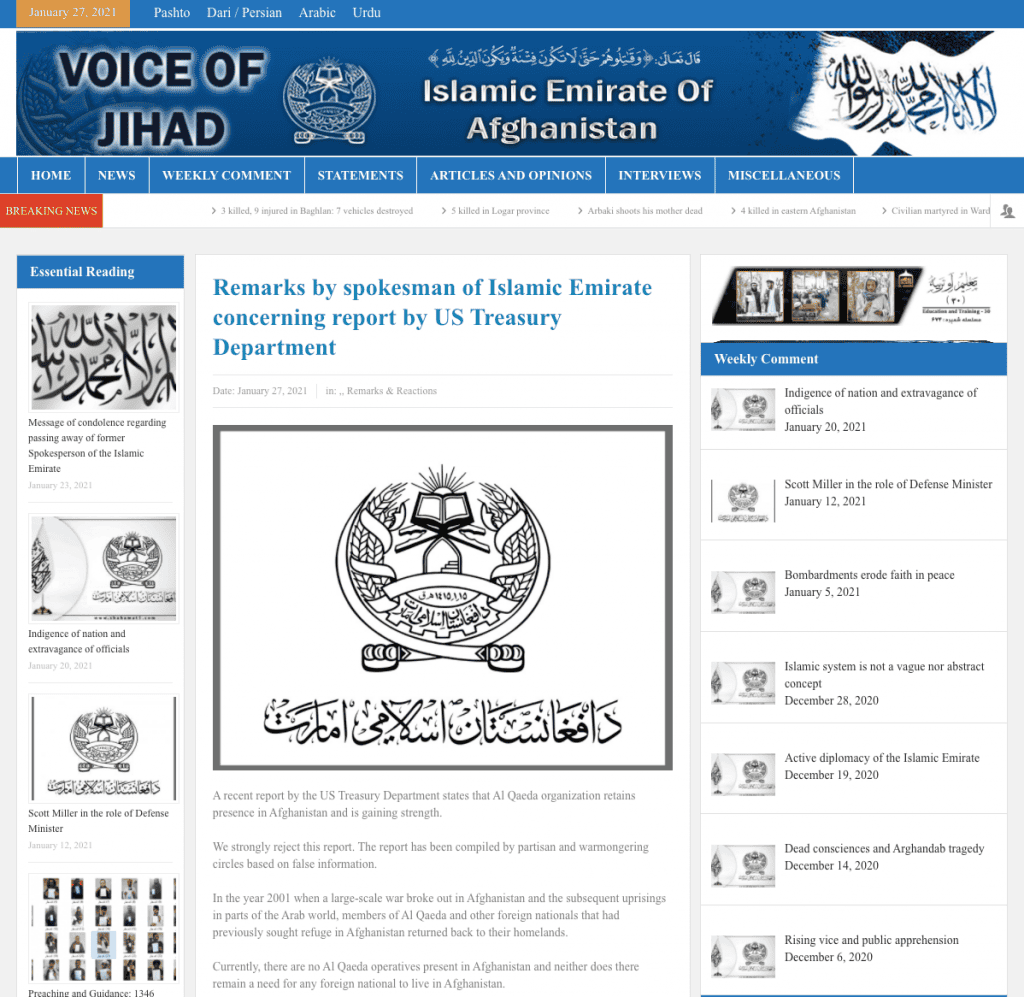
The Taliban has once again attempted to falsely claim “there are no Al Qaeda operatives present in Afghanistan,” despite that fact that U.S. and Afghan forces have killed several senior Al Qaeda leaders in the country over the past year.
Spokesman Zabihullah Mujahid denied today that Al Qaeda is present in Afghanistan in an official statement released on the Taliban’s English language website, Voice of Jihad.
Mujahid made the patently erroneous claim in response to a U.S. Treasury report released earlier this year that noted Al Qaeda was “gaining strength” in Afghanistan with the help and “protection” of the Taliban. [See FDD’s Long War Journal report, Al Qaeda ‘gaining strength’ in Afghanistan, U.S. Treasury says.]
From the Taliban statement:
We strongly reject this report. The report has been compiled by partisan and warmongering circles based on false information.
In the year 2001 when a large-scale war broke out in Afghanistan and the subsequent uprisings in parts of the Arab world, members of Al Qaeda and other foreign nationals that had previously sought refuge in Afghanistan returned back to their homelands.
Currently, there are no Al Qaeda operatives present in Afghanistan and neither does there remain a need for any foreign national to live in Afghanistan.
Remarks by spokesman of Islamic Emirate concerning report by US Treasury Department, Voice of Jihad, Jan. 27, 2021
The Taliban’s claim that Al Qaeda “returned back to their homelands” after the U.S. invasion following the Sept. 11, 2001 attack on the U.S. is laughable.
It is well documented that many Al Qaeda leaders have been killed in Afghanistan in the nearly two decades since 9/11. In the past two years, U.S. and Afghan forces have killed several key Al Qaeda leaders, including Husam Abd-al-Ra’uf (Abu Muhsin al-Masri), a top propagandist and ideologue; Asim Umar, the emir of Al Qaeda in the Indian Subcontinent; and Mohammad Hanif, a senior AQIS leader.
Not only has the Taliban been sheltering Al Qaeda, it was consulting with Al Qaeda’s top leaders – according to the United Nations – while it negotiating with the U.S. to withdraw American forces. The U.S. and the Taliban signed the withdrawal agreement, called the Doha agreement, on Feb. 29, 2020.
The Taliban’s denial of Al Qaeda’s presence in Afghanistan is nothing new. [See FDD’s Long War Journal reports, Taliban is caught in a lie by denying Al Qaeda’s presence in Afghanistan, Taliban falsely claims al Qaeda doesn’t exist in Afghanistan and Taliban again denies presence of foreign fighters in Afghanistan.]
It has maintained this fiction since signing the withdrawal agreement with the U.S., as the only condition placed on the Taliban is that it not allow terror attacks to emanate from Afghan soil. Instead of supposedly “destroying Al Qaeda,” as former U.S. Secretary of State Mike Pompeo laughingly claimed the Taliban would do, the Taliban instead decided to pretend Al Qaeda doesn’t exist in Afghanistan.
The Taliban, in its latest statement, claims it supports the Doha agreement. U.S. officials have bragged that the Taliban can be an effective counterterrorism partner against Al Qaeda. Yet, it’s impossible for the Taliban to be an effective counterterrorism partner when it won’t even admit that Al Qaeda remains in Afghanistan, let alone under its own roof with Taliban protection.







